This article may contain affiliate links. Please see our affiliate disclaimer in the footer menu for more information. Thank you for your support!
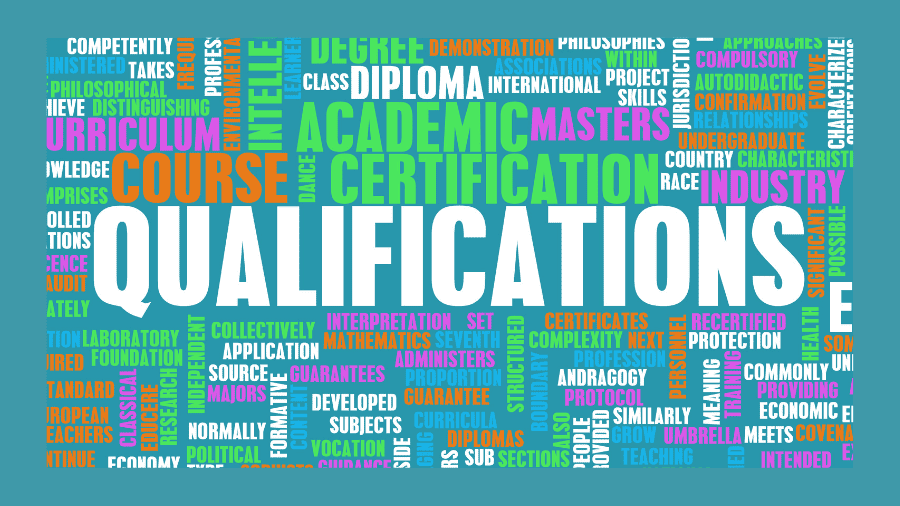
If you’re curious about what qualifications are essential for proofreaders, I can help you. As someone who works as a proofreader, I’ll let you know the ones you do and don’t need for various jobs.
As a general rule, proofreaders do not need any qualifications. Instead, they need relevant knowledge and a specific skill set. However, some proofreading jobs require additional credentials—a degree or experience being the most common.
In this article, we’ll discover the basic qualifications needed to work as a proofreader and the additional ones required for specific jobs. We’ll also see how you can prove you’re a qualified proofreader, even if you don’t have any “extra” credentials.
Essential Proofreader Qualifications
So what kind of knowledge and skills are required to be a proofreader?
Let’s break down what you need to know according to hard and soft skills.
These skills are the only qualifications you must have.
Hard Skills Needed to Be a Proofreader
Hard skills are the job-specific skills and know-how that enable us to do our work effectively and efficiently.
Here are the hard skills that proofreaders need:
- strong punctuation, grammar, capitalization, and spelling skills
- ability to correct basic formatting faux pas (e.g., improper spacing, wrong font size or style)
- familiarity with at least one of the four major style guides used for proofreading
- computer skills (knowledge of specific software)
- broad general knowledge
- strong written communication skills
- some business and marketing know-how (freelancers only)
Most of these skills are self-explanatory, but I’d like to briefly explain two of them.
When I mention being familiar with a style guide, I’m referring to one of these four major style guides:
- The Chicago Manual of Style
- The Associated Press Stylebook
- the MLA (Modern Language Association) Handbook
- the Publication Manual of the American Psychological Association
And when it comes to software, proofreaders need to know how to use the Track Changes feature in Microsoft Word and the Suggesting feature in Google Docs.
Some proofreaders also learn how to mark up PDFs using Adobe Acrobat, but this isn’t a must.
Soft Skills Needed to Be a Proofreader
Soft skills are the personal attributes that make us well-suited for certain types of work.
These are the soft skills that proofreaders need:
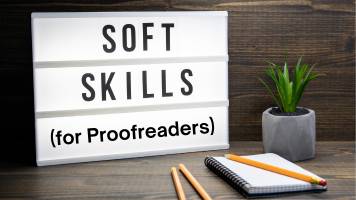
- capable of concentrating for long periods
- meticulous
- able to work alone
- self-disciplined
- independent thinker
- highly organized (to meet deadlines)
- curious (desire to continually learn more)
- love of reading
If you’d like to learn more about how these skills apply to proofreading, I talk about this in an article about the skills proofreaders need to be successful.
And if you want to learn these skills, I penned a post that compares the most reputable online proofreading courses.
Can You Learn Soft Skills?
You may be wondering if it’s possible to learn soft skills.
It is possible if you adopt a beginner’s mindset and dedicate yourself to developing them (source).
If you’d like a better idea of whether you’re well-suited to proofreading, I wrote a post about signs you’d be a strong proofreader.
I think good proofreaders are both born and made.
While I believe having an aptitude for proofreading is important, I think proper training and experience go a long way in making someone a capable proofreader.
We’ve seen the basic qualifications proofreaders need to start working in the industry.
Now let’s look at other credentials that are not needed to work in the field.
The caveat is that you’ll need one or more of these qualifications to pursue certain proofreading opportunities—namely, higher-paying ones.
Nonessential (but Desirable) Qualifications
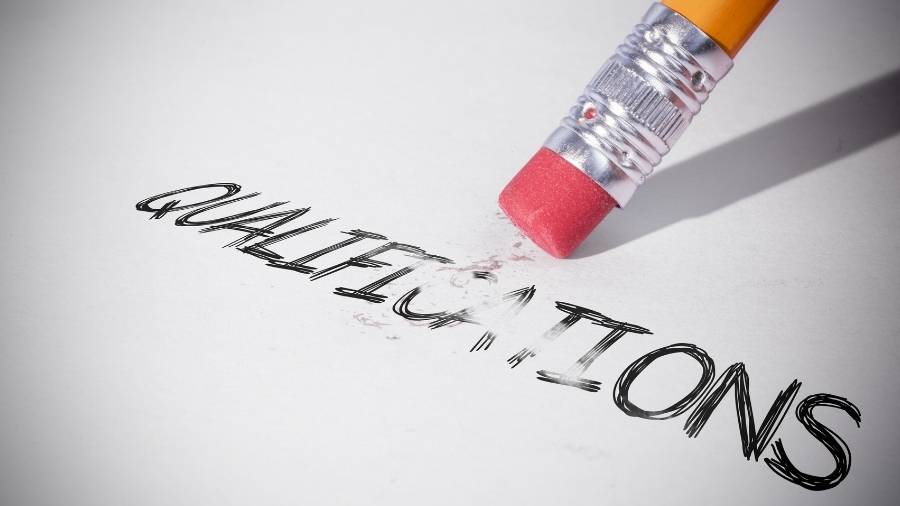
Here’s a list of five qualifications you don’t have to have to be a proofreader:
- a college degree
- proofreading experience
- a professional certification in proofreading
- a proofreading certificate (although this is helpful)
- knowledge of proofreading marks
1) You Do Not Need a Degree to Be a Proofreader
I wrote an article about how a degree is not needed to be a proofreader.
In a brief article about book proofreaders, ZipRecruiter says the following:
“There are no formal education requirements to become a book proofreader, though some employers prefer candidates with an associate or bachelor’s degree in English, communications, journalism, or a related field.”
– ZipRecruiter
You may be surprised that Penguin Random House—one of the “Big Five” trade book publishers—does not require their proofreaders (or most other employees) to have a degree.
Paige McInerny, VP of Human Resources at Penguin Random House, tells us this:
“We do not have a mandatory, companywide higher education requirement for working at Penguin Random House U.S.”
– Penguin Random House
Of course, the reading and writing you do in college make you a stronger proofreader.
However, plenty of people without a degree are avid readers and excellent writers.
I would hire a proofreader who received training but didn’t have a degree over someone who had a degree but hadn’t been trained to be a proofreader.
This decision would be a no-brainer.
But Some Proofreading Jobs Require a Degree

A degree is required for certain jobs. You typically find these jobs in publishing companies where they want proofreaders to have a degree in English or a related field.
However, as we discovered, Penguin Random House is an exception to the norm.
You may also need a degree if you work for a proofreading and editing company, especially one that caters to clients with texts in the medical, scientific, or technology genre.
Sometimes this requirement also applies to companies whose proofreaders work on theses and dissertations.
Moreover, proofreaders often need a master’s or doctoral degree if they work with especially complex medical, scientific, or technological documents.
If you’d like to see examples of businesses that do and don’t require a degree, feel free to read my post about jobs for novice proofreaders. Most of the companies in this article don’t require their proofreaders to have a degree.
After every job on the list, I include a section about requirements.
2) You Don’t Need Experience to Be a Proofreader
I authored an article about how you can become a proofreader without experience.
If you start by offering proofreading services on freelance platforms like Upwork, Fiverr, or PeoplePerHour, you won’t need any experience.
However, if you freelance for an online proofreading and editing company, you may need experience.
Or you may be required to pass a proofreading test to prove you have the skills to kick errors to the curb!
Be aware that these tests aren’t a walk in the park.
You’ll need to know your stuff to be able to pass them!
But Proofreading Experience Is Needed for Some Jobs
Of course, higher-paying opportunities with online companies (and elsewhere) will likely require you to have experience.
You can look forward to these opportunities after you’ve logged a significant number of hours on error patrol.
3) You Do Not Need a Professional Certification
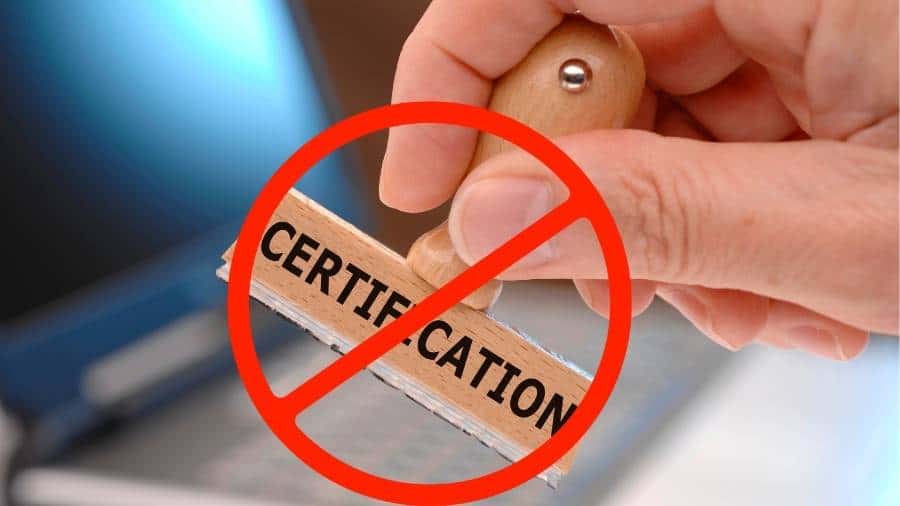
A professional certification is different from a proofreading certificate.
No organization in the US can grant you professional certification in proofreading.
The only way to obtain this certification is to pass a rigorous proofreading exam offered by Editors Canada.
In this article about proofreader certification, I explain how to register for the exam. Editors Canada suggests you have at least five years of full-time proofreading experience before you attempt the test.
Yes, it’s difficult. It’s also quite expensive.
Few proofreaders decide to obtain a professional certification.
I’m not certified, nor are any of the proofreaders I know.
But Certification May Help You Get the Most Desirable Jobs
If you want a shot at the crème de la crème of proofreading jobs, this certification may help you.
However, opportunities abound for those who don’t hold a certification.
4) You Don’t Need a Proofreading Certificate
The most reputable proofreading courses on the market allow you to earn or be given a proofreading certificate.
Although you don’t have to possess a certificate, you’ll have a competitive advantage if you do.
But Having a Certificate Can Make It Easier to Get Clients
A certificate shows potential clients you’ve received formal training, which lends credibility to your skills and makes you more hirable.
Ideally, you’ll want a certificate to post in your profile on a freelance marketplace or your proofreading business website.
But, again, it’s not mandatory.
5) You Don’t Need Knowledge of Proofreading Marks
I posted an article about whether we still use proofreading marks. The brief answer is yes, but not very often.
As digital proofreading methods become more popular, proofreading symbols (aka proofreaders’ marks) are losing their footing in the publishing industry.
But if You Work for a Publishing Company, You May Need This Knowledge
Some publishing companies want you to know how to use—or at least be familiar with—proofreaders’ marks, usually for one of two reasons:
- The publishing house still uses them to mark up paper copies (you’ll typically find this in smaller publishing houses that haven’t updated their proofreading methods).
- The publishing company wants their proofreaders to be familiar with these marks since they’re the foundation for some symbols used in digital proofreading.
However, if you work with self-publishing authors, you won’t need any know-how related to proofreaders’ marks.
As a freelance proofreader, I’ve never had a client ask me to use these glyph-like symbols.
You may be interested in proofreading marks because they’re essential to the history of proofreading.
Even though I haven’t mastered these symbols, I’m aware of them and appreciate their role in the publishing industry.
How to Prove You’re a Qualified Proofreader: Sans Experience
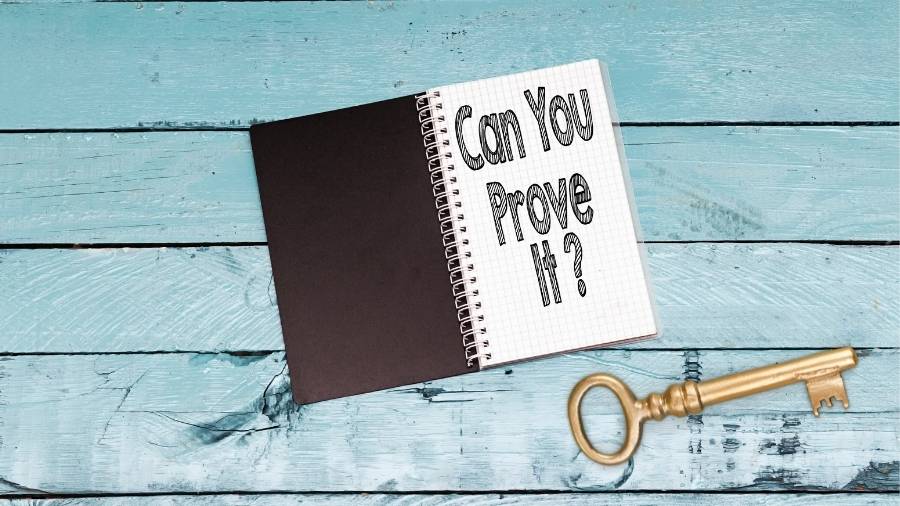
The proper set of skills is the key to opening the door to most proofreading jobs.
Let’s see how you can score jobs if you have solid skills but lack some, or all, of the other qualifications mentioned in this article.
We’ve already seen two ways to demonstrate proof of your skills:
- acquire a proofreading certificate
- pass a proofreading test
Now let’s see a couple more.
1) Give Potential Clients a Sample Edit
You can provide a sample edit to prove your skills to individual clients.
A sample edit is when you proofread a small section of the middle portion of a client’s writing. Some proofreaders charge a fee for this, and some don’t.
The sample edit will let the client see the value you can provide.
2) Obtain Good Reviews on Marketplaces
Another way to attract clients is to get good reviews on marketplaces like Fiverr and Upwork.
Getting good reviews shouldn’t be a problem if you have the skill set we’ve discussed.
These testimonials serve as a magnet for additional customers.
Frequently Asked Questions
Is it difficult to become a proofreader?
Becoming a proofreader requires effort and dedication, but it’s not too challenging if you have an interest in and aptitude for the work. If you enjoy reading, tend to spot errors, don’t mind working alone, and can stay focused, becoming a proofreader shouldn’t be too difficult.
How much does a proofreader get paid?
ZipRecruiter (February 2024) reports that most freelance proofreaders in the US make between $42,500 and $70,000 per year, with the average salary being $57,520.
A beginner proofreader can expect to make about $12–$18 per hour.
The US Bureau of Labor Statistics (May 2022) states that proofreaders working in the US make an average hourly wage of $23.45, or $48,770 annually.
I hope this post helped you identify the qualifications you need to be a proofreader.
Check out this article on Om Proofreading if you’d like to start honing your proofreading skills by putting them to the test.
“It’s all about love. Making someone else’s existence just a little easier . . . nothing else matters. I know this now.”
– Terrence McKenna
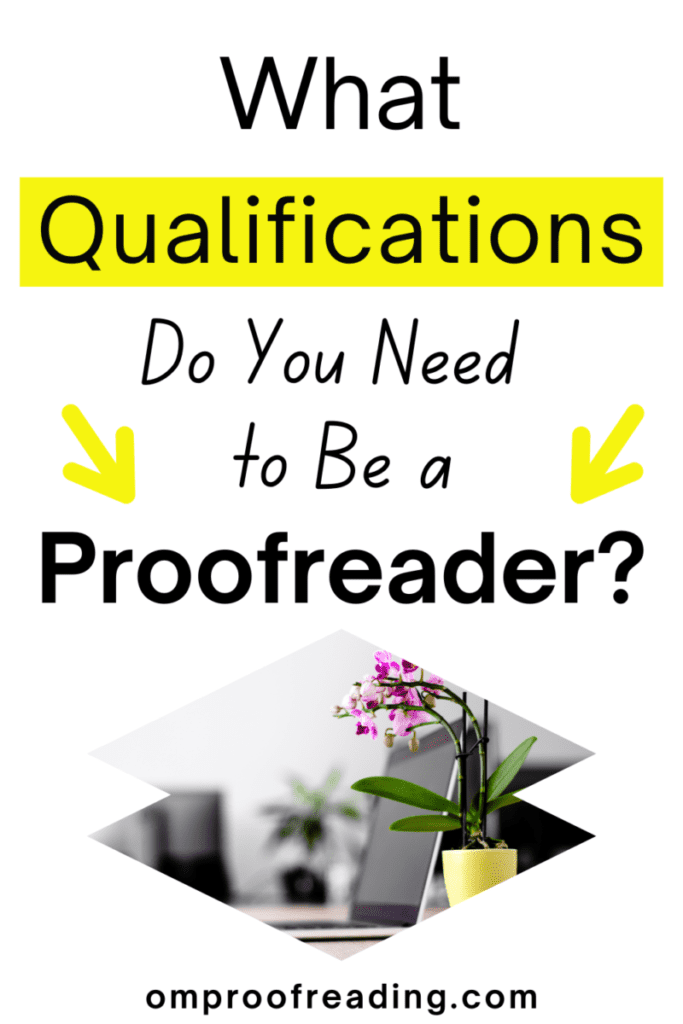
Recent Posts
Punctuation is important because it enables us to communicate our message clearly and effectively. Without punctuation, we wouldn’t understand how units of a sentence relate to one another or how...
Although you're probably somewhat familiar with adverbs, you may be unaware of sentence adverbs. As a trained proofreader who has studied the parts of speech, I can help you understand this unique...
